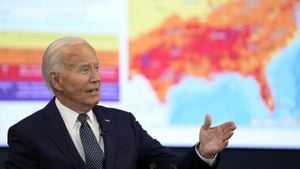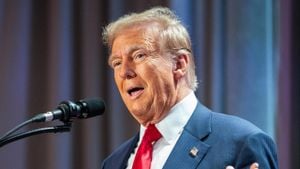Chinese President Xi Jinping and outgoing U.S. President Joe Biden met for what seemed to be their final face-to-face encounter during the Asia-Pacific Economic Cooperation (APEC) summit held recently in Lima, Peru. This pivotal meeting highlighted the necessity of continuing dialogues, especially as both nations navigate through murky political waters.
Against the backdrop of Donald Trump's impending inauguration—and the transition it signifies—Biden and Xi focused heavily on the significance of stable U.S.-China relations. During their conversations, they traversed important ground, addressing various contentious issues including cyber espionage, trade tensions, the situation concerning Taiwan, and the nuclear threats posed by North Korea.
Xi's approach was characterized by cautious optimism. He openly declared, “China is ready to work with a new U.S. administration to maintain communication, expand cooperation, and manage differences,” setting the tone for what he hopes will be constructive engagement under Trump, whose “America First” rhetoric could lead to heightened tensions.
Trade has been one of the most pressing issues discussed. With Trump reportedly considering imposing up to 60 percent tariffs on Chinese imports, the potential for exacerbated trade relations looms large. Xi argued against such protectionist measures, emphasizing mutual cooperation instead.
Cybersecurity also formed a cornerstone of the dialogue. Biden raised concerns about recent intelligence hacks attributable to Chinese sources, which compromised U.S. internal communications. Xi, on his part, dismissed the allegations, insisting on the need to avoid jumping to conclusions without substantial evidence.
When it came to the contentious issue of Taiwan, the meeting experienced friction. Biden urged Xi to refrain from military activity surrounding Taiwan, emphasizing the importance of peace and stability. Conversely, Xi criticized Taiwan’s leadership, asserting actions taken by President Lai Ching-te were detrimental to peaceful interactions.
Global politics complicate matters even more. Xi reiterated China's claim over the South China Sea, cautioning the U.S. against interference, particularly with issues surrounding the Spratly Islands, which have been the subject of various territorial disputes.
North Korea surfaced as another matter on the table. Biden pressed Xi to utilize China's significant influence over North Korea to deter the latter from engaging more deeply with Russia amid the Ukraine crisis, highlighting the interconnected nature of international relations.
While both leaders conveyed their commitment to staying engaged on significant issues, human rights remained thorny territory. Biden brought up the detainment of American citizens by China, pressing for their humane treatment and eventual release. Both sides acknowledged the complexity of human rights discussions, but breakthroughs were sparse.
Interestingly, the conversations hinted at broader concerns over technology, particularly artificial intelligence and military decision-making. Biden and Xi reached harmony on one rare point: reaffirming the necessity for human oversight over nuclear weapon decisions, lest AI complicate matters of existential importance.
Both leaders also touched upon the economic strategies reinforcing their populous nations. Biden’s administration faces difficulty as U.S. companies pivot away from reliance on Chinese manufacturing, signaling potential fallout from the geopolitical rivalry.
Xi’s outreach to Latin America during this summit demonstrates China's ambitions to fill gaps left by the U.S., especially during this transition period. With efforts like the rejuvenated trade agreement with Peru and the Chancay port's inauguration, Xi is not just signaling to the U.S. but extending China’s reach and influence globally.
Both Biden and Xi sense the precarious balance necessary for their respective countries to maintain not just peace but mutual growth and cooperation. Their final meeting as leaders had underlying tones of urgency to set the stage for future interactions under different political climates.
With Trump’s presidency ushering the possibility of more adversarial U.S.-China relations, the dialogue encapsulated during this summit could be pivotal. Xi's emphasis on avoiding conflict and promoting cooperation paints the picture of what he envisions moving forward—a stable U.S.-China relationship benefitting not only the two nations but, as Xi stressed, possibly the future of humanity itself. Whether the new administration reciprocates this openness remains to be seen, as international dynamics continue to evolve at dramatic speeds.
Now, as we reflect on Biden's and Xi's legacies, it becomes clear: the path forward will require dedication to dialogue and diplomacy, balancing firm stances on difficult issues with incentives for collaboration. The world will be watching how these interactions shape up as the new power dynamics take root.



